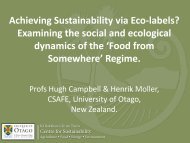Book of Abstract (incl. addendum) - IFSA symposium 2012
Book of Abstract (incl. addendum) - IFSA symposium 2012
Book of Abstract (incl. addendum) - IFSA symposium 2012
You also want an ePaper? Increase the reach of your titles
YUMPU automatically turns print PDFs into web optimized ePapers that Google loves.
Workshop 3.1 Farming Systems’ adaptation to climate change<br />
(types <strong>of</strong> grass and associated area and usage), and feeding diet along a 12 month cycle in a given<br />
economic and climatic scenarios. The generation and evaluation <strong>of</strong> each configuration are done<br />
collectively in a participatory workshop and exploit a simple balance model. A diversity <strong>of</strong> use is<br />
permitted by this game depending on the matter being discussed. The paper describes its use in the<br />
design <strong>of</strong> dairy systems adapted to climate variability and change expected by 2050. From our<br />
experience with the forage rummy, we synthesise lessons about key factors enhancing participation,<br />
focus and depth <strong>of</strong> discussion, and learning about the relevance <strong>of</strong> potential farming systems<br />
adaptations.<br />
Development <strong>of</strong> Agricultural Innovations in Organic Agriculture to adapt to<br />
Climate Change – Results from a Transdisciplinary R&D Project in North-<br />
Eastern Germany<br />
Sonja Siart, Andrea Knierim, Ralf Bloch and Johann Bachinger<br />
Leibnitz Centre for Agricultural Landscape Research (ZALF), Germany<br />
Sonja.Siart@zalf.de<br />
Based on concepts for innovation processes and co-production <strong>of</strong> knowledge, approaches are searched<br />
to address the urgent and complex problems related to climate change, where especially the<br />
participation <strong>of</strong> and close collaboration with practice partners is claimed. The paper presents the<br />
agricultural knowledge management approach in the module on organic agriculture in the R&D project<br />
INKA BB (Innovation Network for Climate Change Adaptation Brandenburg Berlin) in north-eastern<br />
Germany (Knierim et al. 2009). The methodology for the science-practice collaboration follows an<br />
action research approach that supports the communication and cooperation <strong>of</strong> researchers and<br />
practitioners. The framework is the action research cycle with the iterative stages <strong>of</strong> planning, action<br />
and reflection. The module on organic agriculture, where individual research questions are addressed<br />
on several farms, will be presented as a good practice example for close transdisciplinary network<br />
cooperation. The workshop contribution will provide insights in and reflections on the process <strong>of</strong><br />
innovation development over two project years.<br />
Farming Systems within Protected Areas and dealing with drought and<br />
elephant invasion: Climate change challenges in Limpopo National Park,<br />
Mozambique<br />
Nicia Givá and Nadarajah Sriskandarajah<br />
Swedish University <strong>of</strong> Agricultural Sciences, Sweden<br />
Ngiva@uem.mz<br />
Drought and elephants are interconnected factors that determine food security in the Limpopo National<br />
Park (LNP) Multiple Use Zone (MUZ) communities. About 30.000 people inhabit the so called MUZ<br />
relying on rain fed agriculture for their livelihoods. The low and unpredictable rainfall pattern (320 to<br />
450 mm year-1) under semi arid conditions, coupled with low input technology shape the main farming<br />
systems. Cropping in different locations, seeding at every rainfall event regardless <strong>of</strong> the season, mixed<br />
crops to ensure crop diversity and reduce crop failure risk are some <strong>of</strong> the adaptive strategies <strong>of</strong> MUZ<br />
communities to cope with recurrent drought events. The effectiveness <strong>of</strong> all the adopted strategies is<br />
further challenged by elephant invasion in the park setting, with consequent crop damage. This paper<br />
assesses how MUZ communities respond to drought and elephant pressure to overcome food<br />
insecurity. Participant observation, in-depth and semi-structured interviews, participatory mapping and<br />
a survey with 106 households were used to gather qualitative and quantitative data on socio-economic<br />
and seasonal livelihoods variations, between February 2008 and July 2009. Results show a positive<br />
relationship between droughts and crop damaged by elephants. The number <strong>of</strong> elephant raids increases<br />
with intensity and severity <strong>of</strong> drought, up to five or more invasions per cropped area. As a<br />
55











